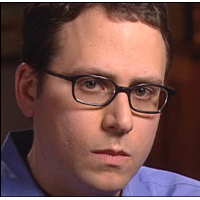California May Give Ex-Journalist and Serial Liar Stephen Glass Permission to Practice Law
 Stephen Glass
Stephen Glass
Stephen Glass is sorry he regularly just made stuff up as a staff writer for the New Republic and contributor to Rolling Stone, Harper’s and Policy Review in the late ‘90s. He got caught fabricating whole stories, dialogue, characters, events, and the notes and documentation necessary to fool his bosses, and was kicked out of the profession.
So what does a 20-something wunderkind with a talent for bullshit do with the rest of his life when his chosen profession as journalist is no longer available to him?
In the case of Glass, he decided to become a lawyer and on Wednesday the California Supreme Court will hear oral arguments over whether they should approve his admission to the state bar and he be allowed to practice his new craft.
Certain ethical questions have been raised. The Los Angeles Times asked in an editorial: “Should a Liar be a Lawyer?” and answered “yes.” Although Glass committed “journalistic malpractice on an epic scale,” the newspaper reasoned that he committed his sins long ago, had apologized to the victims and was deemed rehabilitated.
But the Committee of Bar Examiners disagreed with the Times editorial board by weighing all that against the enormity of his deceit and found him still lacking the “positive moral character” required by it to recommend he be admitted to the bar.
Glass was an associate editor at The New Republic when the story of his antics broke in May 1998. He had written a story called “Hack Heaven” that included a profile of a 15-year-old computer hacker who was hired as a security consultant by a company called “Jukt Micronics” after hacking into their system. The article, written in first-person as if Glass were a fly on the wall, included detailed conversations between the hacker, Ian Restil, and Jukt management.
It was all a lie. There was no Ian Restil, no Jukt Micronics and no story. A Forbes reporter tried to verify the article’s information and hit dead end after dead end. Glass’ editor, Charles Lane, also was having no luck verifying the story until he called a phone number of a Jukt executive in Palo Alto the reporter provided. That turned out to be Glass’ brother and Lane fired his rising star.
Glass wrote 41 stories for the New Republic, 27 of which were eventually determined to be fraudulent. The writer went to extraordinary lengths to create fabricated support for his stories, including bogus business cards, fake websites and imaginary hacker newsletters. He also lied about public figures. In one story, he falsely portrayed former Urban League head Vernon Jordan, a close friend of President Bill Clinton, as a lecherous jerk who hit on women despite their reluctance.
Glass lied in his stories, he lied when he was caught and he lied for years afterward about what he had done. The story of his stories was presented in the 2003 film “Shattered Glass,” which was based on a 1998 Vanity Fair story of the same name.
Joe Nocera wrote an op-ed for the New York Times in 2011 that made the case for letting him be a lawyer. Glass graduated Georgetown University Law Center after his journalism career disappeared. He clerked for a couple of Washington D.C. judges, but couldn’t get a job after that. Glass passed the state bar in New York but the state’s committee of bar examiners opposed his admission and he left the state. He received a reported six-figure deal for writing a thinly-disguised novel of his exploits in 2003, appeared on TV shows like “60 Minutes”—journalist Andrew Sullivan said he had adopted “contrition as a career move”—and worked as a paralegal before passing the California bar exam and applying for admission to the bar in 2009.
His employer and colleagues seem to like him and respect his work.
The Committee of Bar Examiners rejected Glass, but he petitioned the bar for a hearing and was found to be of “good moral character” and eligible for admittance. The committee appealed the decision and the final arbiter of admission, the state Supreme Court, agreed in 2011 to weigh in on reportedly its first review of moral character as a qualification in more than a decade.
On Wednesday, the court will take the measure of the man in preparation for a decision on whether someone seen as too unethical to be a journalist is ethical enough to be a lawyer.
–Ken Broder
To Learn More:
Disgraced Ex-Journalist Stephen Glass Seeks Right to be California Lawyer (by Howard Mintz, San Jose Mercury News)
A Tissue of Lies: The Stephen R. Glass Index (Rick McGinnis)
Disgraced Reporter Stephen Glass Taking Case for Bar Admission to Calif. Supreme Court (by Brent Lang and Pamela Chelin, The Wrap)
Should a Liar be a Lawyer? (Los Angeles Times editorial)
Glass’s Road to Redemption (by Joe Nocera, New York Times op-ed)
Stephen Glass, Disgraced Journalist, Seeks California Law License (by Maura Dolan, Los Angeles Times)
Shattered Glass (by Buzz Bissinger, Vanity Fair)
- Top Stories
- Controversies
- Where is the Money Going?
- California and the Nation
- Appointments and Resignations
- Unusual News
- Latest News
- California Forbids U.S. Immigration Agents from Pretending to be Police
- California Lawmakers Urged to Strip “Self-Dealing” Tax Board of Its Duties
- Big Oil’s Grip on California
- Santa Cruz Police See Homeland Security Betrayal in Use of Gang Roundup as Cover for Immigration Raid
- Oil Companies Face Deadline to Stop Polluting California Groundwater





